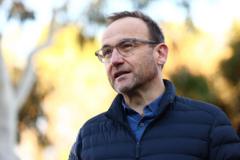Alberta's political landscape is increasingly influenced by calls for independence as frustration with the federal Liberals grows. Grassroots movements gain momentum, pushing for sovereignty, with some Albertans even entertaining the idea of joining the United States as a potential solution to their grievances.
Alberta's Independence Movement Gains Traction Amid Political Frustration

Alberta's Independence Movement Gains Traction Amid Political Frustration
Growing calls for Alberta's independence spotlight frustrations with Ottawa and highlight cultural ties to the U.S.
The tension surrounding Alberta's relationship with the rest of Canada has intensified, fueled by growing grievances against federal policies and a decade-long Liberal governance. At a recent town hall in Lethbridge, Alberta, a significant portion of attendees expressed support for either independence or joining the United States, reflecting a shift in sentiments among western Canadians.
Dennis Modry, a retired heart surgeon and co-leader of the Alberta Prosperity Project, spearheaded discussions about Alberta’s future options, asking attendees about their views on autonomy. Half the crowd raised their hands in favor of separation, while another half endorsed the idea of aligning with the U.S.
The rising movement for separation is not solely based on local discontent; international comments from former President Donald Trump reinforcing the idea of Canada as the 51st state have also lent momentum. While Modry dismisses the notion of statehood, stating, “We’re interested in Alberta sovereignty,” others like lawyer Jeffrey Rath suggest a cultural affinity with our American neighbors could pave the way for a rebirth of Alberta as an independent nation.
As Alberta's frustrations have been historically dismissed, many residents feel a sense of "western alienation" from Ottawa, often lamenting their underrepresentation in national affairs. Former Prime Minister Justin Trudeau’s environmental policies have especially fueled anger in the oil-rich province, deepening the divide between Alberta and the more densely populated eastern provinces.
In a recent op-ed, Alberta’s influential conservative figure Preston Manning expressed alarm over the potential for a unity crisis if the Liberal government continues to dominate, arguing that support for the party suggests a vote against western interests. This growing disconnect has shifted the conversation about Alberta’s sovereignty from fringe discussions to a mainstream topic of deliberation.
Despite these rising sentiments, concrete support for full independence remains uncertain. A recent Angus Reid poll indicated that only about 25% of Albertans would vote to leave Canada in a referendum, demonstrating that while frustration is high, outright separation is still a contested goal. Alberta's Premier, Danielle Smith, has warned of a potential crisis if Alberta's demands regarding oil and gas production aren’t addressed promptly by the new government, emphasizing that genuine grievances must be recognized.
As political leaders navigate these turbulent waters, the divide between Alberta and eastern Canada continues to necessitate a careful balance. Though some in Alberta push for independence, others advocate for a better partnership within Canada rather than a complete split. The ongoing political discourse will play a crucial role in shaping Alberta's future, especially in light of the upcoming federal elections that could determine the fate of many existing relationships.
In this evolving context, what will become of Alberta's ambitions for autonomy remains a pressing question with ramifications that could reshape the national landscape.























